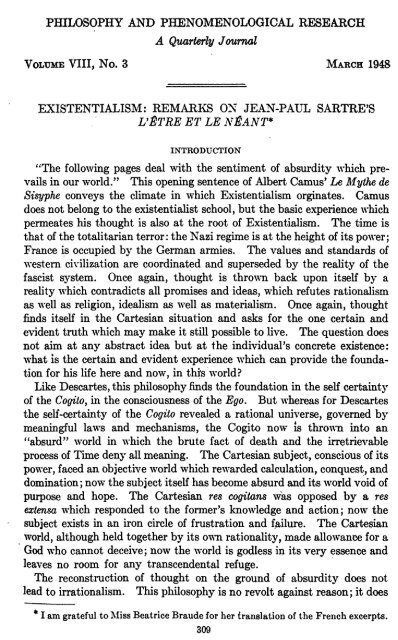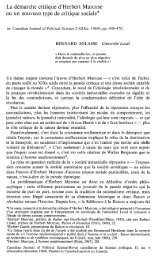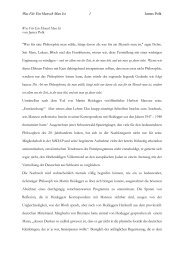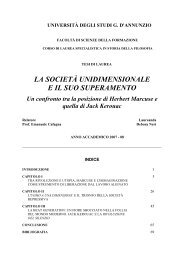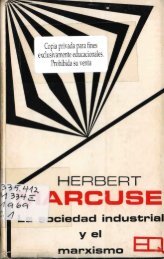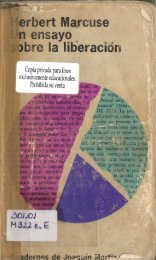Existentialism: Remarks on Jean-Paul Sartre's L'Etre ... - Marcuse.org
Existentialism: Remarks on Jean-Paul Sartre's L'Etre ... - Marcuse.org
Existentialism: Remarks on Jean-Paul Sartre's L'Etre ... - Marcuse.org
You also want an ePaper? Increase the reach of your titles
YUMPU automatically turns print PDFs into web optimized ePapers that Google loves.
PHILOSOPHY AND PHENOMENOLOGICAL RESEARCH<br />
A Quarterly Journal<br />
VOLUME VIII, No.3 MARCH 1948<br />
EXISTENTIALISM: REMARKS OX JEAN-PAUL SARTRE'S<br />
L'BTRE ET LE NEANT*<br />
INTRODUCTION<br />
"The following pages deal with the sentiment of absurdity which prevails<br />
in our world." This opening sentence of Albert Camus' Le Myihe de<br />
Sisyphe c<strong>on</strong>veys the climate in which <str<strong>on</strong>g>Existentialism</str<strong>on</strong>g> <strong>org</strong>inates. Camus<br />
does not bel<strong>on</strong>g to the existentialist school, but the basic experience which<br />
permeates his thought is also at the root of <str<strong>on</strong>g>Existentialism</str<strong>on</strong>g>. The time is<br />
that of the totalitarian terror: the Nazi regime is at the height of its power;<br />
France is occupied by the German armies. The values and standards of<br />
western cidlizati<strong>on</strong> are coordinated and superseded by the reality of the<br />
fascist system. Once again, thought is thrown back up<strong>on</strong> itself by a<br />
reality which c<strong>on</strong>tradicts all promises and ideas, which refutes rati<strong>on</strong>alism<br />
as well as religi<strong>on</strong>, idealism as well as materialism. Once again, thought<br />
finds itself in the Cartesian situati<strong>on</strong> and asks for the <strong>on</strong>e certain and<br />
evident truth which may make it still possible to live. The questi<strong>on</strong> does<br />
not aim at any abstract idea but at the individual's c<strong>on</strong>crete existence:<br />
what is the certain and evident experience which can provide the foundati<strong>on</strong><br />
for his life here and now, in this world?<br />
Like Descartes, this philosophy finds the foundati<strong>on</strong> in the self certainty<br />
of the Cogito, in the c<strong>on</strong>sciousness of the Ego. But whereas for Descartes<br />
the self-certainty of the Cogito revealed a rati<strong>on</strong>al universe, governed by<br />
meaningful laws and mechanisms, the Cogito now is thrown into an<br />
"absurd" world in which the brute fact of death and the irretrievable<br />
process of Time deny all meaning. The Cartesian subject, c<strong>on</strong>sciCius of its<br />
power, faced an objective world which rewarded calculati<strong>on</strong>, c<strong>on</strong>quest, and<br />
dominati<strong>on</strong>; now the subject itself has become absurd and its world void of<br />
purpose and hope. The Cartesian res cogitans w'as opposed by a res<br />
extensa which resp<strong>on</strong>ded to the former's knowledge and acti<strong>on</strong>; now the<br />
subject exists in an ir<strong>on</strong> circle of frustrati<strong>on</strong> and (ailure. The Cartesian<br />
world, although held together by its own rati<strong>on</strong>ality, made allowance for a<br />
God who cannot deceive; now the world is godless in its very essence and<br />
leaves no room for any transcendental refuge. .<br />
The . rec<strong>on</strong>structi<strong>on</strong> of thought <strong>on</strong> the ground of absurdity does not<br />
lead to irrati<strong>on</strong>alism. This philosophy is no revolt against reas<strong>on</strong>; it does<br />
* I am grateful to Miss Beatrice Braude for her translati<strong>on</strong> of the French excerpts.<br />
309
EXISTENTIALISM 313<br />
The questi<strong>on</strong> thus aims at the full and c<strong>on</strong>crete structure of the human<br />
being as being-in-the-world (la realite humaine) .<br />
. In order to elucidate this structure, the' analysis orients itself <strong>on</strong> certain<br />
typical "human attitudes" (c<strong>on</strong>duites exemplaires). The first of these is<br />
the attitude of questi<strong>on</strong>ing (l'attitude interrogative), the specific human<br />
attitude of interrogating, reflecting <strong>on</strong> himself and his situati<strong>on</strong> at any<br />
given moment. The interrogati<strong>on</strong> implies a threefold (potential) negativ- -<br />
ity: the not-knowing, the permanent possibility of a negative answer, and<br />
the limitati<strong>on</strong> expressed in the affirmative answer: "It is thus and not<br />
otherwise." The interrogative attitude thus brings to the fore the fact<br />
that man is surrounded by and permeated with negativity:<br />
"C'est la possibilite permanente de n<strong>on</strong>-etre, hors de nous et en nous, qui<br />
c<strong>on</strong>diti<strong>on</strong>ne nos questi<strong>on</strong>s sur l'etre."7<br />
However, the negativity implied in the interrogative attitude serves <strong>on</strong>ly<br />
as an example and indicati<strong>on</strong> of the fundamental fact that negativity<br />
surrounds and permeates man's entire existence and all his attitudes:<br />
"La c<strong>on</strong>diti<strong>on</strong> necessaire pour qu'il soit possible de dire n<strong>on</strong>, c'est que Ie<br />
n<strong>on</strong>-etre soit une presence perpetuelle, en nous et en dehors de nous, c'est que<br />
Ie neant hante I 'etre."8<br />
Negativity originates with and c<strong>on</strong>stantly accompanies the human being,<br />
manifesting itself in a whole series of negati<strong>on</strong>s (neantissati<strong>on</strong>s) with which<br />
the human being experiences, comprehends, and acts up<strong>on</strong> himself and the<br />
world. The totality of these negati<strong>on</strong>s c<strong>on</strong>stitutes the very being of the<br />
subject: man exists "comme mode perpetuel d'arrachement a ce qui est"j9<br />
he transcends himself as well as his objects toward his and their possibilities,<br />
he is always "bey<strong>on</strong>d" his situati<strong>on</strong>, "wanting" his full reality. By<br />
the same token, man does not simply exist like a thing (en soi) but makes<br />
himself and his world exist, "creates" himself and his world at any moment<br />
and in any situati<strong>on</strong>.<br />
This characterizati<strong>on</strong> of the "realite humaine" (which is hardly more<br />
than a restatement of the idealistic c<strong>on</strong>cepti<strong>on</strong> of the Cogito or Selfc<strong>on</strong>sciousness,<br />
especially in the form in which the Pherurmenology of Mind<br />
develops this c<strong>on</strong>cepti<strong>on</strong>) furnishes the fundamental terms of <strong>Sartre's</strong><br />
<str<strong>on</strong>g>Existentialism</str<strong>on</strong>g>-,the terms which guide the subsequent development of his<br />
philosophy. - There is first of all the identificati<strong>on</strong> of the human being with<br />
7 Page 40. "It is the permanent possibility of not-being, outside of us and in us,<br />
which c<strong>on</strong>diti<strong>on</strong>s our questi<strong>on</strong>s about being,"<br />
8 Page 47. "The necessary c<strong>on</strong>diti<strong>on</strong> which makes it possible to Bay 'no' is that<br />
the not-being is perpetually present, in us and outside of UB, is that the void haunts<br />
being."<br />
9 Page 73. "as perpetually detaching himself from what is."
EXISTENTIALISM 315<br />
Human existence is at any moment a "project" that is being· realized,<br />
freely designed and freely executed by man himself, or, man's existence is<br />
nothing but his own fundamental project. This dynamics is based <strong>on</strong> the<br />
fact that man's actual situati<strong>on</strong> never coincides with his possibilities, that<br />
his Being is essentially being-in-want-of (manque). However, the want is<br />
not want of something, so that the want would disappear with its satisfactoin;<br />
it is the manifestati<strong>on</strong> 6f the basic negath·ity of the human being:<br />
"La realite humaine n'est pas quelque chose qui existerait d'abord pour manquer<br />
par apres de ceci ou de cela: elle existe d'abord comme manque et en liais<strong>on</strong><br />
syntMtique immediate avec ce qu'elle manque .... La realite se saisit<br />
dans sa venue a l'existence comme litre incomplet .... La realite humaine est<br />
depassement perpetuel vers une coincidence qui n'est jamais d<strong>on</strong>nee."13<br />
The existentialist dynamics is thus not an aimless and senseless <strong>on</strong>e:<br />
the "project f<strong>on</strong>damental" which is man's existence aims at the ever lacking<br />
coincidence with himself, at his own completeness and totality. In other<br />
word,s, the Pour-soi c<strong>on</strong>stantly strives to become En-soi, to become the<br />
stable and lasting foundati<strong>on</strong> of his own being. But this project, which<br />
would make the Pour-soi an En-soi and vice versa, is eternally c<strong>on</strong>demned<br />
to frustrati<strong>on</strong>, and this <strong>on</strong>tological frustrati<strong>on</strong> shapes and permeates the<br />
entire Being of man:<br />
"La realite humaine est souffrante dans s<strong>on</strong> etre, parce qU'elie surgit a I'lItre<br />
comme perpetuellement hantee par une totalite qu'elle est sans pouvoir<br />
l'etre, puisque justement elle ne pourrait atteindre l'en-soi sans se perdre<br />
comme pour-soL Elle est d<strong>on</strong>c par nature c<strong>on</strong>sciensce malheureuse ... "14<br />
<strong>Sartre's</strong> <strong>on</strong>tological analysis has herewith reached its center: the determinati<strong>on</strong>·of<br />
the human being as frustrati<strong>on</strong>, Scheitern, "echec." All fundamental<br />
human relati<strong>on</strong>ships, the entire "human enterprise" are haunted<br />
by this frustrati<strong>on</strong>. However, precisely because frustrati<strong>on</strong> is permanent<br />
and inevitable (since it is the <strong>on</strong>tological characteristic of the human being),<br />
it is also the very foundati<strong>on</strong> and c<strong>on</strong>diti<strong>on</strong> of human freedom. The latter<br />
is what it is <strong>on</strong>ly in so far as it "engages" man ,,;thin his c<strong>on</strong>tingent situa-<br />
but a series of enterprises (undertakings), he is the sum total, the <strong>org</strong>anizati<strong>on</strong>, the<br />
ensemble of the relati<strong>on</strong>ships which c<strong>on</strong>stitute these enterprises."<br />
13 VEtTe et Ie Neant, pp. 132 f. "Human reality is not something which first exists<br />
in order to want for this or that later; it exists as want and in close synthetic uni<strong>on</strong><br />
with what it wants .... In its coming into being, (human) reality is cognizant of itself<br />
as an incomplete being .... Human reality is a perpetual reaching for a coincidence<br />
which is never accomplished."<br />
14 Page 134. "Human reality suffers in its being because it emerges into existence<br />
as though perpetually haunted by a totality which it is without being able to be it,<br />
since in effect it cannot attain Being-in-itself without losing Being-for-itself. It is<br />
therefore 'essentially unhappy c<strong>on</strong>sciousness."
EXISTENTIALISM' 319<br />
there is no breaking out of the circle of frustrati<strong>on</strong>. On the other hand,<br />
man must "engage" in <strong>on</strong>e of these attitudes because his very:reality c<strong>on</strong>sists<br />
in nothing but such "engagement." Thus, after the failure of each<br />
attempt,<br />
"il ne reste plus au pour-soi qu'A rentrer dans Ie cercle et A se laisser indefiiniment<br />
ballotter de l'une A l'autre des deux attitudes f<strong>on</strong>damentales."26<br />
Here, the image of Sisyphus and his absurd task appears most naturally<br />
as the very symbol of man's existence. Here, too, Sartre deems it appropriate<br />
to add in a footnote that "these c<strong>on</strong>siderati<strong>on</strong>s do not exclude<br />
the possibility of a morality of liberati<strong>on</strong> and salvati<strong>on</strong>"; however, such a<br />
morality requires a "radical c<strong>on</strong>versi<strong>on</strong>, which we cannot discuss at this<br />
place."<br />
II<br />
The main <strong>on</strong>tological argument is c<strong>on</strong>cluded by this analysis of the<br />
fundamental interhuman relati<strong>on</strong>ships; the remaining part of the book is<br />
taken up by a synopsis of the "realite humaine" as it has emerged in the<br />
preceding interpretati<strong>on</strong>. The synopsis is guided by the c<strong>on</strong>cept of freedom.<br />
The <strong>on</strong>tological analysis had started with the identificati<strong>on</strong> of Ego<br />
(Cogito) and freedom. The subsequent development of the existential<br />
characteristics of the Ego had shown how his freedom is inextricably tied up<br />
within the c<strong>on</strong>tingency of his "situati<strong>on</strong>," and how all attempts to make<br />
himself the free foundati<strong>on</strong> of his existence are eternally c<strong>on</strong>demned to<br />
frustrati<strong>on</strong>. The last part of <strong>Sartre's</strong> book resumes the discussi<strong>on</strong> at this<br />
point in order to justify finally, in the face of these apparent c<strong>on</strong>tradicti<strong>on</strong>s,<br />
the <strong>on</strong>tological identificati<strong>on</strong> of human being and freedom.<br />
For Sartre, the justificati<strong>on</strong> cannot be that which is traditi<strong>on</strong>ally featured<br />
in idealistic philosophy, namely, the distincti<strong>on</strong> between transcendental<br />
and empirical freedom., This soluti<strong>on</strong> cannot suffice for him because his<br />
analysis of the Ego does not remain 'within the transcendental-<strong>on</strong>tological<br />
dimensi<strong>on</strong>. Ever since his Ego, in the Third Part of his book, had to<br />
acknowledge the existence of the Other as a plain "necessite de fait," his<br />
philosophy had left the realm of pure <strong>on</strong>tology and moved within the<br />
<strong>on</strong>tic-empirical world.<br />
Sartre thus cannot claim that his philosophy of freedom is a transcendental-<strong>on</strong>tological<br />
<strong>on</strong>e and therefore neither committed nor equipped to go<br />
into the (empirical) actuality of human freedom. Quite in c<strong>on</strong>trast to<br />
Heidegger (whose existential analysis claims to remain within the limits of<br />
26 Page 484. "there is no alternative left for the Being-for-itself but to return into<br />
the circle and to be tossed about indefinitely from <strong>on</strong>e to the other of these two fundamental<br />
attitudes."
EXISTENTIALISM 321<br />
c<strong>on</strong>diti<strong>on</strong> at any moment because these values will cease to exist for him as<br />
so<strong>on</strong> as he ceases to posit, accept, and suffer them. Sartre understands<br />
this freedom as a strictly individual liberty, the decisi<strong>on</strong> to change the<br />
situati<strong>on</strong> as a strictly individual project, and the act of changing is a<br />
strictly individual enterprise.<br />
The fact that for the individual worker such individual acti<strong>on</strong> would<br />
mean loss of his job and probably lead to starvati<strong>on</strong>, impris<strong>on</strong>ment, and<br />
even death, does not invalidate his absolute freedom, for it is again a<br />
matter of free choice to value life and security higher than starvati<strong>on</strong>, impris<strong>on</strong>ment,<br />
and death. The existentialist propositi<strong>on</strong> thus leads inevitably<br />
to the reaffirmati<strong>on</strong> of the old idealistic c<strong>on</strong>cepti<strong>on</strong> that man is<br />
free even in chains, or, as Bartre formulates it,<br />
"mais les tenailles du bourreau ne nous dispensent pas d'etre libre."'O<br />
However, Sartre does not want to have this propositi<strong>on</strong> interpreted in the<br />
sense of a merely "internal" freedom. The slave is literally and actually<br />
free to break his chains, for the very meaning ("sens") of his chains reveals<br />
itself <strong>on</strong>ly in the light of the goal which he chooses: to remain a slave or to<br />
risk the worst in order to liberate himself from enslavement.<br />
"S'il choisit, par example, la revolte, I'esclavage, loin d'etre d'abord un<br />
obstacle a. cette revolte, ne prend s<strong>on</strong> sens et s<strong>on</strong> coefficient d'adversite que<br />
par elle."11<br />
All adversities, obstacles, limitati<strong>on</strong>s to our liberty are thus posited by<br />
and emerge ("surgir") with ourselves; they are parts of the free "project"<br />
which is our existence :32<br />
"Le coefficient d'adversite des choses ... ne saurait etre un argument c<strong>on</strong>tre<br />
notre liberte, car c'est par noU8, c'est-a.-dire par la positi<strong>on</strong> prealable d'une<br />
fin que surgit se coefficient d'adversite. Tel rocher, qui manifeste une resistance<br />
prof<strong>on</strong>de si je veux Ie deplacer, sera, au c<strong>on</strong>traire, une aide precieuse si<br />
. je veux l'escalader pour c<strong>on</strong>templer Ie paysage.""<br />
Bartre does not hesitate to push this c<strong>on</strong>cepti<strong>on</strong> to its last c<strong>on</strong>sequences.<br />
Being a Frenchman, a Southerner, a worker, a Jew-is the result of the<br />
10 Page 587. "but the executi<strong>on</strong>er's tools cannot dispense us from being free."<br />
II Page 635. "If, for example, he chooses to revolt, slavery, far from being first an<br />
obstacle to this revolt, takes its meaning and its coefficient of adversity <strong>on</strong>ly from this<br />
revolt."<br />
II Pages 562, 569.<br />
II Page 562. "The coefficient of adversity of things ... cannot be an argument<br />
against our freedom because it is through U8, that is, through the preliminary setting<br />
of a goal that this coefficient of adversity emerges. The very rock which displays<br />
profound resistance if I wish to change its positi<strong>on</strong>, will, <strong>on</strong> the other hand, be a precious<br />
help to me if I wish to climb it in order to c<strong>on</strong>template the countryside."
!: EXISTENTIALISM 323<br />
nalia which characterized the heydays of individualistic society. The<br />
"Pour-soi" appears with the attributes of absolute aut<strong>on</strong>omy, perpetual<br />
ownership, and perpetual appropriati<strong>on</strong> (just as the Other appears as the<br />
<strong>on</strong>e who usurps, appropriates, and appraises my world, as the "thief" of<br />
my possibilities). Behind the nihilistic language of <str<strong>on</strong>g>Existentialism</str<strong>on</strong>g> lurks<br />
the ideology of free competiti<strong>on</strong>, free initiative, and equal opportunity.<br />
Everybody can "transcend" his situati<strong>on</strong>, carry out his o\m project:<br />
everybody has his absolutely free choice. However adverse the c<strong>on</strong>diti<strong>on</strong>s,<br />
man must "take it" and make compulsi<strong>on</strong> his self-realizati<strong>on</strong>.<br />
Everybody is master of his destiny. But in the face of an "absurd world"<br />
without meaning and reward, the attributes of the heroic period of bourgeois<br />
society assume naturally an absurd and illusory character. <strong>Sartre's</strong><br />
"Pour-soi" is closer to Stirner's Einziger und sein Eigentum than to Descartes'<br />
Cogito. In spite of <strong>Sartre's</strong> insistence <strong>on</strong> the Ego's Geworfenhcit<br />
(being thrown into) a pregiven c<strong>on</strong>tingent situati<strong>on</strong>, the latter seems to be<br />
wholly absorbed by the Ego's ever-transcending power which posits, as its<br />
own free project, all the obstacles encountered <strong>on</strong> its ,,-ay. True, man is<br />
thrown into a "situati<strong>on</strong>" which he himself has not created, and this<br />
situati<strong>on</strong> may be such that it "alienates" his freedom, degrades him into a<br />
thing. The process of "reificati<strong>on</strong>" appears in manyfold forms in <strong>Sartre's</strong><br />
philosophy: as the alienati<strong>on</strong> of my world and my liberty through the<br />
Other, as the subordinati<strong>on</strong> of the "Pour-soi" to the standardized technics<br />
of every day life,36 as the interchangeability of the individual.37 But<br />
to Sartre reificati<strong>on</strong> as well as its negati<strong>on</strong> are <strong>on</strong>ly obstacles <strong>on</strong> which<br />
man's freedom thrives and feeds itself: they become parts of the Cogito's<br />
existential project, and the whole process <strong>on</strong>ce again seryes to illustrate the<br />
perpetual liberty of the "Pour-soi" which finds <strong>on</strong>ly itself in the most<br />
alienated situati<strong>on</strong>.<br />
The Self-c<strong>on</strong>sciousness that finds itself in its Being-for-Others: <strong>Sartre's</strong><br />
<str<strong>on</strong>g>Existentialism</str<strong>on</strong>g> thus revives Hegel's formula for the free and rati<strong>on</strong>al c<strong>on</strong>diti<strong>on</strong><br />
of man. To Hegel, however, the realizati<strong>on</strong> of this c<strong>on</strong>diti<strong>on</strong> is<br />
<strong>on</strong>ly the goal and end of the entire historical process. Sartre takes the<br />
<strong>on</strong>tological shortcut and transforms the process into the metaphysical<br />
c<strong>on</strong>diti<strong>on</strong> of the "Pour-soi." Sartre accomplishes this transformati<strong>on</strong> by<br />
a trick: the term "Pour-soi" covers the We as well as the I; it is the collective<br />
as well as the individual self-c<strong>on</strong>sciousness.<br />
Ie Pour-soi "fait qu'il soit date par ses techniques",38<br />
"se fait Fran-;ais, meridi<strong>on</strong>eI, ouvrier ... ,"39 etc.<br />
36 Pages 495 ff., 594.<br />
:rrpage496.<br />
38 Page 604.<br />
39 Page 606.
324 PmLOSOPHY AND PHENOMENOLOGICAL RESEARCH<br />
Thus, the "Pour-soi" creates nati<strong>on</strong>, class, class distincti<strong>on</strong>s, etc., makes<br />
them parts of his own free "project," and, c<strong>on</strong>sequently, is "resp<strong>on</strong>sible"<br />
for them. This is the fallacious identificati<strong>on</strong> of the <strong>on</strong>tological and<br />
historical subject. While it is a truism to say that the ideas "nati<strong>on</strong>,"<br />
"class," etc., arise with and "exist" <strong>on</strong>ly for the "Pour-soi," "nati<strong>on</strong>,"<br />
"class," etc., are not created by the "Pour-soi," but by the acti<strong>on</strong> and reacti<strong>on</strong><br />
of specific social groups under specific historical c<strong>on</strong>diti<strong>on</strong>s. To be<br />
sure, these groups are composed of individuals who may be <strong>on</strong>tologically<br />
characterized as "Pour-soi," but such characterizati<strong>on</strong> is totally irrelevant<br />
to the understandiIig of their c<strong>on</strong>creteness. The <strong>on</strong>tological c<strong>on</strong>cept of<br />
the "Pour-soi," which defines equally the wage earner and the entrepreneur,<br />
the salesclerk and the intellectual, the serf and the landlord, prejudices the<br />
analysis of their c<strong>on</strong>crete existence: in so far as the different existential<br />
situati<strong>on</strong>s are interpreted in terms of the realizati<strong>on</strong> of the "Pour-soi," they<br />
are reduced to the abstract denominator of a universaf essence. In subsuming<br />
the various historical subjects under the <strong>on</strong>tological idea of the<br />
"Pour-soi," and making the latter the guiding principle of the existential<br />
philosophy, Sartre relegates the specific differences which c<strong>on</strong>stitute the<br />
very c<strong>on</strong>creteness of human existence to mere manifestati<strong>on</strong>s of the universal<br />
essence of man-thus offending against his o\"n thesis that "existence<br />
creates the essence." Reduced to the role of examples, the c<strong>on</strong>crete situaati<strong>on</strong>s<br />
cannot bridge the gap between the terms of <strong>on</strong>tology and those of<br />
existence. The <strong>on</strong>tological foundati<strong>on</strong> of <str<strong>on</strong>g>Existentialism</str<strong>on</strong>g> frustrates its<br />
effort to develop a philosophy of the c<strong>on</strong>crete human existence.<br />
The gap between the terms of <strong>on</strong>tology and those of existence is c<strong>on</strong>cealed<br />
by the equivocal use of the term "is." <strong>Sartre's</strong> "is" functi<strong>on</strong>s<br />
indiscriminately and without mediati<strong>on</strong> as the copula in the definiti<strong>on</strong> of<br />
the essence of man, and as the predicati<strong>on</strong> of his actual c<strong>on</strong>diti<strong>on</strong>. In this<br />
twofold sense, the "is" occurs in propositi<strong>on</strong>s like "Man is free," "is his<br />
own project," etc. The fact that, in the empirical reality, man is not free,<br />
not his own project, is obliterated by the inclusi<strong>on</strong> of the negati<strong>on</strong> into the<br />
definiti<strong>on</strong> of "free," "project," etc. But <strong>Sartre's</strong> c<strong>on</strong>cepts are, in spite of<br />
his dialectical style and the pervasive role of the negati<strong>on</strong>, decidedly.<br />
undialectica1. In his philosophy, the negati<strong>on</strong> is no force of its own but is<br />
a priori absorbed into the affirmati<strong>on</strong>. True, in <strong>Sartre's</strong> analysis, the<br />
development of the subject through its negati<strong>on</strong> into the self-c<strong>on</strong>scious<br />
realizati<strong>on</strong> of its project appears as a process, but the process-character is<br />
illusory: the subject moves in a circle.<br />
Existentialist freedom is safe from the tribulati<strong>on</strong>s to which man is<br />
subjected in the empirical reality. However, in <strong>on</strong>e respect, the empirical<br />
reality does affect <strong>Sartre's</strong> c<strong>on</strong>cept of human liberty. Although the freedom<br />
which is operative as the very being of the "Pour-soi" accompanies
EXISTENTIALISM 327<br />
Whatever activity the desire may engender, all "technique amoureuse,"<br />
accrues to it from outside. The desire itself is "purement et simplement<br />
desir d'un objet transcendant," namely, "desir d'un corps." And this<br />
object is desired purely and simply as what it is and appears, in its brute<br />
"facticite. "<br />
In describing the "desir sexuel" and its object, Sartre emphasizes the<br />
characteristics which make this relati<strong>on</strong> the very opposite of the "Poursoi"<br />
and its activity:<br />
-" ..• dans Ie desir sexuella c<strong>on</strong>science est comme empatee, il semble qu'<strong>on</strong><br />
se laisse envahir par la facticite; qu'<strong>on</strong> cesse de la fuir et qu'<strong>on</strong> glisse vers un<br />
c<strong>on</strong>sentement passif au desir."u<br />
This is the coming-to-rest of the transcending Cogito, the paralysis of its<br />
freedom, "projects," and performances. And the same force which cancels<br />
the incessant performance of' the "Pour-soi" also cancels its alienati<strong>on</strong>.<br />
The "desir seA'Uel" reveals its object as stripped of all the attitudes, gestures,<br />
and affiliati<strong>on</strong>s which make it a standardized instrument, reveals the<br />
"corps comme chair" and thereby "comme revelati<strong>on</strong> fascinante de la<br />
facticite.4i Enslavement and repressi<strong>on</strong> are cancelled, not in the sphere of<br />
purposeful, "projective" -activity, but in the sphere of the "corps vecu<br />
comme chair," in the "trAme d'inertie."46 By the same token, the image<br />
of fulfillment and satisfacti<strong>on</strong> is, not in the evertranscending "Pour-soi,"<br />
but in its own negati<strong>on</strong>, in its pure "etre-Ia," in the fascinati<strong>on</strong> of its being<br />
an object (for itself and for others). Reificati<strong>on</strong> itself thus turns into<br />
liberati<strong>on</strong>.<br />
The "desir sexuel" accomplishes this negati<strong>on</strong> of the negati<strong>on</strong> not as a<br />
mere relapse into animal nature, but as a free and liberating human relati<strong>on</strong>.<br />
In other words, the "desir sexuel" is what it is <strong>on</strong>ly as activity of the<br />
"Pour-soi," an activity, however, which is rather the negati<strong>on</strong> of all<br />
activity and which aims at the liberati<strong>on</strong> of the pure presence of its object.<br />
This activity is "la caresse":<br />
"Le desir s'exprime par la caresse comme la pensee par Ie langage."47<br />
The breaking of the reified world, the revelati<strong>on</strong> of the "chair ... comme<br />
c<strong>on</strong>tingence pure de la presence" is <strong>on</strong>ly brought about by the "caresse":<br />
4( Page 457. " .•. in sexual desire'c<strong>on</strong>sciousness is as,though dulled; <strong>on</strong>e appears<br />
to let <strong>on</strong>eself be pervaded by the mere facticity (of <strong>on</strong>e's existence as body), to cease<br />
fleeing from it, and to glide into a passive ascent to desire."<br />
45 Page 458. Reveals "the body as flesh," as the "fascinating revelati<strong>on</strong> of facticity.<br />
"<br />
46 "the body lived as flesh," in the "web of inertia."<br />
47 Page 459. "Desire expresses itself through caress as thought does through<br />
language. "
328 PmLOSOPHY AND PHENOMENOLOGICAL RESEARCH<br />
"La caresse fait nattre Autrui comme chair pour moi et pour lui-m6me."<br />
... Elle "revele la chair en deshabillant Ie corps de s<strong>on</strong> acti<strong>on</strong>, en Ie scindant<br />
des pOBBibilites qui l'entourent .... "41<br />
It is thus in complete isolati<strong>on</strong> from its possibilities, oblivious of its freedom<br />
and resp<strong>on</strong>sibility, divested of all its performances and achievements,<br />
in being a pure "object" ("corps vecu comme chair") that the E(J() finds<br />
itself in the Other. The relati<strong>on</strong>ships am<strong>on</strong>g men have become relati<strong>on</strong>ships<br />
am<strong>on</strong>g things, but this fact is no l<strong>on</strong>ger c<strong>on</strong>cealed and distorted by<br />
societal fetishes and ideologies. Reificati<strong>on</strong> no l<strong>on</strong>ger serves to perpetuate<br />
exploitati<strong>on</strong> and toil but is in its entirety determined by the "pleasure<br />
principle."<br />
Moreover, the fundamental change in the existential structure caused<br />
by the "desir sexuel" affects not <strong>on</strong>ly the individuals c<strong>on</strong>cerned but also<br />
their (objective) world. The "desir sexuel" has, according to Sartre, a<br />
genuinely cognitive functi<strong>on</strong>: it reveals the (objective) world in a new form.<br />
"Si m<strong>on</strong> corps ... n'est plus senti comme l'instrument qui ne peut etre<br />
utilise par aucun instrument, c'est-a.-dire comme l'<strong>org</strong>anisati<strong>on</strong> synthetique<br />
de mes actes dans Ie m<strong>on</strong>de; s'iI est vecu comme chair, c'est comme renvois a<br />
ma chair que je saisis les objets du m<strong>on</strong>de. Cela signifie que je me fais passif<br />
par rapport a. eux .... Un c<strong>on</strong>tact est caresse, c'est-a-dire que ma percepti<strong>on</strong><br />
n'est pas utilisati<strong>on</strong> de l'objet et depassement du present en vue d'une fin;<br />
mais percevoir un objet, dans l'attitude desirante, c'est me caresser a. lui."49<br />
The "attitude desirante" thus releases the objective world as well as the<br />
Ego from dominati<strong>on</strong> and manipulati<strong>on</strong>, cancels their "instrumentality,"<br />
and, in doing so, reveals their own pure presence, their "chair!'<br />
We have seen that the fixati<strong>on</strong> <strong>on</strong> the property relati<strong>on</strong> permeates<br />
<strong>Sartre's</strong> entire book: not <strong>on</strong>ly the relati<strong>on</strong> between the "Pour-soi" and<br />
"En-soi," but also the fundamental relati<strong>on</strong>ships between the "Pour-soi"<br />
and "L'Autrui," the interhuman relati<strong>on</strong>ships are eventually interpreted<br />
in terms of "appropriati<strong>on</strong>." Finally, 'the "desir se"."uel" is the attempt to<br />
appropriate freely the liberty of the Other. That all these appropriati<strong>on</strong>s<br />
turn out to be futile and self-defeating <strong>on</strong>ly renews and perpetuates the<br />
attempt to appropriate. And the <strong>on</strong>e point, the <strong>on</strong>e moment which ap-<br />
48 Ibid. "Caress causes the Other to be born as flesh for me and for himself ....<br />
Caress reveals the flesh by divesting the body of its acti<strong>on</strong>, by isolating it from the<br />
possibilities which surround it .... "<br />
49 Page 461. "If my body ... is no l<strong>on</strong>ger felt to be the instrument which can be<br />
used by any other instrument, that is', as the synthetic <strong>org</strong>anizati<strong>on</strong> of my acts in the<br />
world, if it is lived as flesh, it is then, as reverberati<strong>on</strong> of my flesh, that I seize the<br />
objects in the world. This means that I make myself passive in relati<strong>on</strong>ship to them .<br />
. . . A c<strong>on</strong>tact is caress means that my percepti<strong>on</strong> is not utilizati<strong>on</strong> of an object and<br />
not the transcending of the present with a view to a goal. To perceive an object, in<br />
the attitude of desire, is to caress myself with it."
334 PHILOSOPHY AND PHENOMENOLOGICAL RESEARCH<br />
caused a fundamental gap between the terms of philosophy and the terms of<br />
existence. When Aristotle insisted that philosophy presupposed the<br />
establishment of the arts directed to the necessities of life, he defined not<br />
<strong>on</strong>ly the situati<strong>on</strong> of the philosopher but of philosophy itself. The c<strong>on</strong>tent<br />
of the basic philosophical c<strong>on</strong>cepts implies a degree of freedom from the<br />
necessities of life which is enjoyed <strong>on</strong>ly by a small number of men. The<br />
general c<strong>on</strong>cepts which aim at the structures and forms of being transcend<br />
the realm of necessity and the life of those who are c<strong>on</strong>fined to this realm.<br />
Their existence is not <strong>on</strong> the philosophical level. C<strong>on</strong>versely, philosophy<br />
does not possess the c<strong>on</strong>ceptual instruments for comprehending their<br />
existence, which is the c<strong>on</strong>creteness of the "realite humaine." The c<strong>on</strong>cepts<br />
which do adequately describe this c<strong>on</strong>creteness are not the exemplificati<strong>on</strong>s<br />
and particularizati<strong>on</strong>s of any philosophical c<strong>on</strong>cept. The existence<br />
of a slave or of a factory worker or of a salesclerk is not an· "example" of the<br />
c<strong>on</strong>cept of being or freedom or life or man. The latter c<strong>on</strong>cepts may well<br />
be "applicable" to such formb of existence and "cover" them by their scope,<br />
but this coverage refers <strong>on</strong>ly to an irrelevant part or aspect of the reality.<br />
The philosophical c<strong>on</strong>cepts abstract necessarily from the c<strong>on</strong>crete existence,<br />
and they abstract from its very c<strong>on</strong>tent and essence; their generality<br />
transcends the existence qualitatively, into a different genus. Man as such,<br />
as "kind" is the genuine theme of philosophy; his hie et nunc is the iJX7]<br />
(matter, stuff) which remains outside the realm of philosophy. Aristotle's<br />
di


